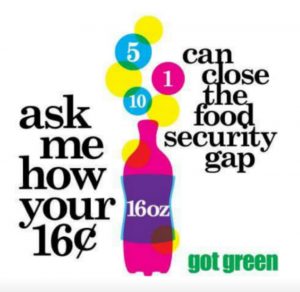
Got Green welcomes the City of Seattle’s proposed Sugary Beverage Tax (SBT), but urges the Mayor and City Council to reinvest ⅓ of the revenue in expanded programs that close the food security gap for working families.
As of now, the SBT is expected to pass, with the vast majority of revenue going to support the Mayor’s plan. We are in support of investments which lift our communities out of poverty and agree that the City should use the majority of SBT revenue to increase equitable education opportunities in Seattle.
However, unless at least ⅓ of the revenue is devoted to closing the food security gap for working families, the Mayor and City Council would be missing an opportunity to bring the fight against obesity one giant leap further toward health equity.
An estimated 122,000 Seattle households are simply unable to afford putting healthy food on their tables.[1] These families earn too much to qualify for assistance programs like Fresh Bucks, but earn too little to pay for the rising cost of healthy food along with the rising cost of living in Seattle.
“I am a single mother with two teenage children. I have a job making a decent wage, but recently experienced a raise in my rent. I struggle to put the healthy food on the table that my children require to stay fit to play sports. I am not able to benefit from the Fresh Bucks program because I do not qualify for EBT/SNAP benefits.” Willea Cooks
Families like these will continue to fall into the food security gap and face long term health issues unless existing programs are strengthened, including:
- Expanding the Fresh Bucks program and Good Food Bags, which are currently only available to people who qualify for Supplemental Nutrition Assistance Program (SNAP)
- Expanding Fresh Bucks into locally-owned grocery markets
- Supporting the Rainier Beach Food Innovation District, which aims to create green job pathways in food production, from locally sourced produce, for young people and underserved communities.
Access to healthy local food is an important pillar for our community’s health and is tied together with equitable outcomes in education. We have learned from our communities that if a child does not have access to healthy food, they may not be able to attend school, or be able to be fully present and learn as their full selves. Many studies support this connection between healthy food and improved education outcomes. [2]
We urge the Mayor and the City Council to pass The Sugary Beverage Tax (SBT) with at least ⅓ of revenue slated for new programs to close the food security gap for working families. With the establishment and growth of the Fresh Bucks program, the City of Seattle has been a national leader for addressing food access in low income communities and communities of color. We urge the City to continue to be a leader and to include targeted funding for programs that close the food security gap and lift our communities out of poverty. In addition, since the tax stands to hit people of color and low-income consumers the hardest, Got Green strongly urges the City of Seattle to implement its Racial Equity Toolkit[3] as it finalizes the reinvestment details of the Sugary Beverage Tax policy.
Take action by calling our Councilmembers / Mayor today!
Got Green encourages Seattle residents to call the mayor and members of City Council to demand that at least ⅓ of revenue from the Sugary Beverage Tax be reinvested in food security for working families. They need to hear and represent our voices as they work on this important new source of revenue that could impact low-income and people of color communities the most. .
Suggested Script for Constituents
Hello Councilmembers / Mayor _______________, my name is _______________ and I am a resident of Seattle.
I am calling about the proposed Sugary Beverage Tax. This tax law should be written using the City of Seattle’s Racial Equity Toolkit to make sure it doesn’t worsen racial inequality in Seattle. I also urge you to make sure that at least ⅓ of the money earned from the Sugary Beverage Tax be spent on closing the Food Security Gap for working families.
Optional: My household falls in the Food Security Gap. Our family needs money from the Sugary Beverage Tax so we can have help putting healthier food on the table.
Mayor’s Murray Office 206.684.4000
CM Burgess Office 206.684.8806
CM Herbold Office 206.684.8803
CM Johnson Office 206.684.8808
CM Harrell Office 206.684.8804
CM Sawant Office 206.684.8016
CM Juarez Office 206.684.8805
CM O’Brien Office 206.684.8800
CM Bagshaw Office 206.684.8801
CM Gonzalez Office 206.684.8802
[1] This figure is the number of Seattle households that qualify for childcare assistance through the City or State of WA minus the number of Seattle households that receive Federal SNAP. In King County an estimated 271,380 households (10%) cannot reliably put enough food or enough healthy food on their table. Almost half (45%) of these food-insecure households earn above 200% of the federal poverty level and are not eligible for food stamps. 271,380 households x 45% = 122,121 households.
[2] See, for example “3 Ways Nutrition Influences Student Learning Potential and School Performance” and studies cited therein.
[3] See the City of Seattle’s “Racial Equity Toolkit to Assess Policies, Initiatives, Programs, and Budget Issues” Link: www.seattle.gov/Documents/…/RSJI/RacialEquityToolkit_FINAL_August2012.pdf
